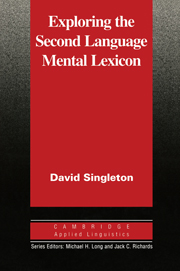Introduction
Published online by Cambridge University Press: 05 October 2012
Summary
Robert Galisson's volume De la langue à la culture par les mots(Galisson, 1991) begins with a discussion of the marginalization of the lexical dimension in L2 language teaching which resulted from the widespread adoption of audio-lingual methodology after the Second World War – a marginalization which has, according to Galisson, continued to a large extent under the more recent ‘communicative’ régime. Whether or not one accepts every detail of Galisson's rather grim portrayal of the place of vocabulary in L2 teaching over the last five decades, it is clear that he has a point. What is equally clear, however, is that he is not alone in wishing to redress the situation. Since the early 1980s there has been a positive explosion of publications on vocabulary aimed at L2 teachers, L2 teacher trainers and L2 course designers (see, e.g., Carter, 1987; Carter 5c McCarthy, 1988; Gairns & Redman, 1986; Hatch & Brown, 1995; M. Lewis, 1993, 1997; Nation, 1990; Schmitt & McCarthy, 1997; Tréville & Duquette, 1996; Wallace, 1982; Willis, 1990), and many of these publications have started from concerns very similar to Galisson's.
The re-valuation of the lexical dimension in the L2 teaching domain echoes, and to an extent reflects, a similar shift towards a greater preoccupation with the lexicon in linguistics in general. It is not that linguists have changed their basic view that the lexicon is that part of a linguistic model which deals with ‘idiosyncratic information’ (cf., e.g., Radford, 1981: 118ff.); it is rather that their researches have led them to the conclusion that very much more of the functioning of language than they had previously imagined is idiosyncratic.
- Type
- Chapter
- Information
- Exploring the Second Language Mental Lexicon , pp. 3 - 7Publisher: Cambridge University PressPrint publication year: 1999

